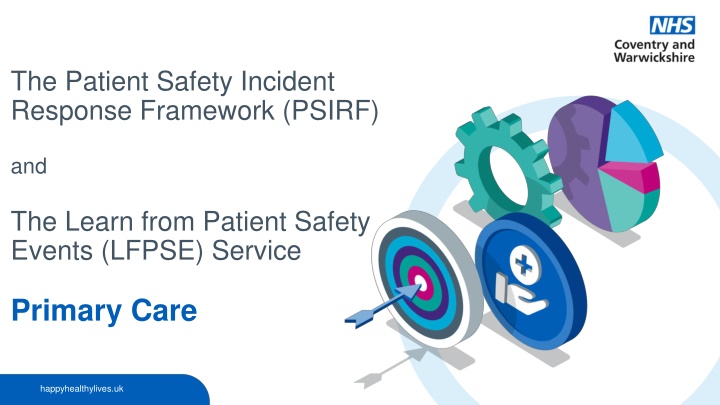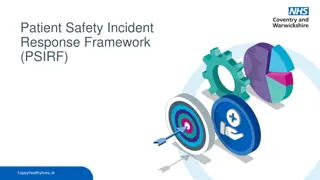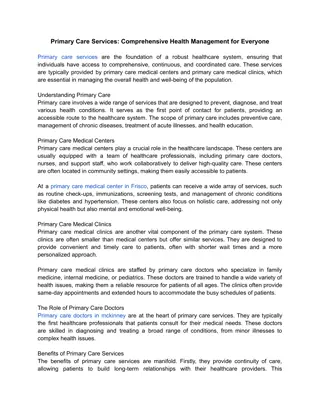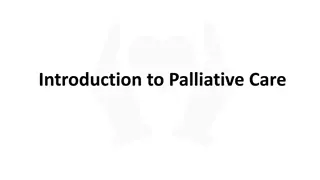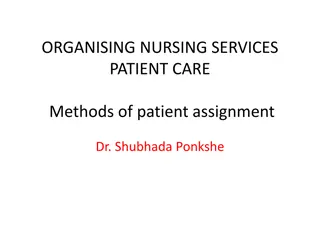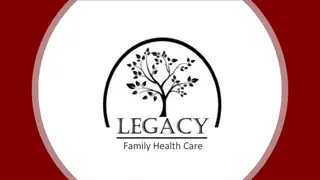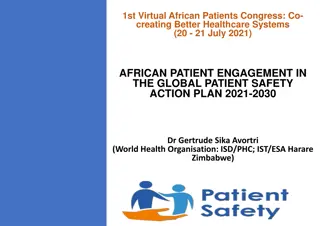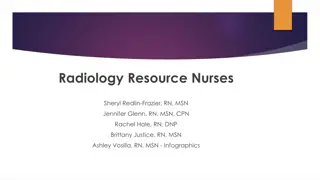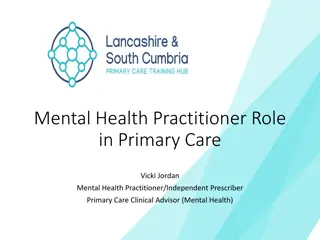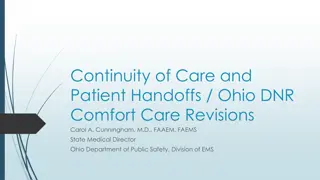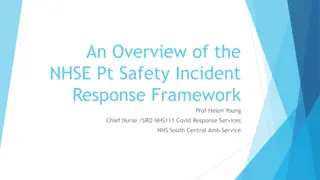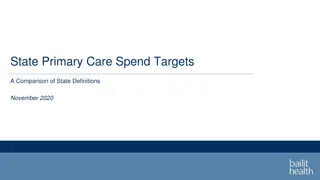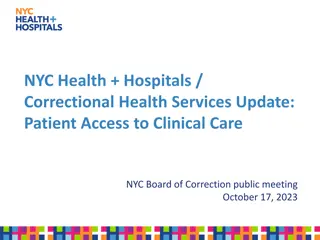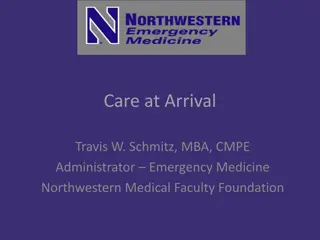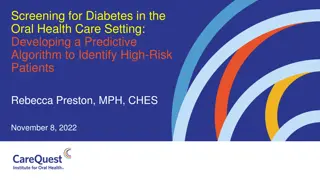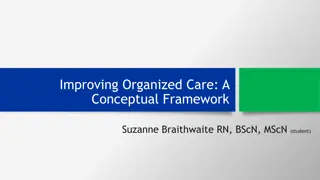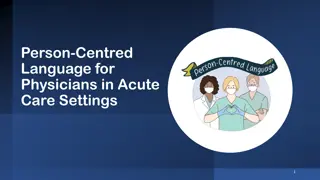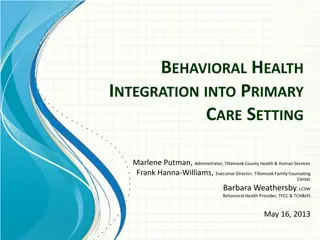Enhancing Patient Safety in Primary Care: PSIRF and LFPSE Overview
The Patient Safety Incident Response Framework (PSIRF) and Learn from Patient Safety Events (LFPSE) aim to improve patient safety by providing a structured approach to incident response and analysis in primary care settings. PSIRF emphasizes compassionate engagement, learning from incidents, proportionate responses, and oversight, while LFPSE offers a centralized platform for recording and analyzing safety events. By utilizing LFPSE, primary care providers can contribute vital data to enhance national insights and support local improvement efforts.
Download Presentation

Please find below an Image/Link to download the presentation.
The content on the website is provided AS IS for your information and personal use only. It may not be sold, licensed, or shared on other websites without obtaining consent from the author.If you encounter any issues during the download, it is possible that the publisher has removed the file from their server.
You are allowed to download the files provided on this website for personal or commercial use, subject to the condition that they are used lawfully. All files are the property of their respective owners.
The content on the website is provided AS IS for your information and personal use only. It may not be sold, licensed, or shared on other websites without obtaining consent from the author.
E N D
Presentation Transcript
The Patient Safety Incident Response Framework (PSIRF) and The Learn from Patient Safety Events (LFPSE) Service Primary Care happyhealthylives.uk
What is PSIRF? Sets out the NHS approach to developing and maintaining effective systems and processes for responding to patient safety incidents (PSI) for the purpose of learning and improving patient safety Will replace the current Serious Incident Framework (2015) PSIRF integrates four key aims: Compassionate engagement and involvement of those affected by PSI Application of a range of system-based approaches to learning from PSI Considered and proportionate responses to PSI Supportive oversight focused on strengthening response system functioning and improvement happyhealthylives.uk
Who does PSIRF apply to? Contractual requirement under NHS Standard Contract, and is mandatory for services provided under that contract including: Acute Ambulance Mental health Community Includes maternity and specialised services Primary care providers may also wish to adopt PSIRF, but it is not a contractual requirement at this stage. happyhealthylives.uk
What is LFPSE? The Learn from Patient Safety Events (LFPSE) platform is a new central service for the recording and analysis of patient safety events that occur in healthcare LFPSE has replaced the National Reporting and Learning System (NRLS) and the Strategic Executive Information System (StEIS) will continue in the short term. It is available to all health and care providers free of charge It has been designed as a web-based system to better suit the needs of Primary Care and avoid the need for separate Local Risk Management System (such as Datix). happyhealthylives.uk
Why should I use LFPSE? Less than 1% of the 2.2 million reports received by the NRLS each year are from primary care, despite this being where most patient interactions take place This limited information about patient safety events occurring in primary care reduces the profile and support available for improvement The LFPSE data will be aggregated at national level to generate insights that support positive change to improve the safety of care for all patients (including National Patient Safety Alerts) Primary care can also use their own data from LFPSE to support local response and governance around patient safety events. This supports effective management, mitigation and learning activities. Events recorded in LFPSE can be used for significant event analysis. With a LFPSE account, users can log in to review and update records they have previously drafted or shared and can use an easy summary-print option to keep copies to support CPD and personal reflection happyhealthylives.uk
Why report? High reporting practices are regarded as safe practices, as they have a culture of openness and willingness to reflect, learn and share Many serious incidents are preceded by a number of related near miss or low-level incidents. Acting early and involving other organisations like PCN s, the ICB or other local practices can prevent near misses becoming causes of serious harm Most incidents do not occur in isolation they occur or are repeated across integrated healthcare systems. Early identification and reporting allows the system to address concerns and avoid repeating incidents, thereby protecting patients Sharing and receiving learning from incidents can save practices time, money and stress Reporting incidents will enable the ICB to support affected staff with Primary Care when things do go wrong Demonstrating a robust approach to identifying, reporting, investigating and learning from incidents supports professional development and registration around appraisal and revalidation requirements for GP s and nurses and regulatory requirements for CQC. happyhealthylives.uk
Recording primary care patient safety events on LFPSE To record events on LFPSE primary care staff will input information directly via an online account This has been designed for use by staff anywhere healthcare is delivered by organisations registered with an ODS code this include general practice. Healthcare staff can register for a LFPSE account via the web-based service LFPSE Incident Recording - Set up an account to continue (learn-from-patient- safety-events.nhs.uk) Details of patient safety events can be submitted to LFPSE by completing an online form happyhealthylives.uk
How LFPSE supports patient safety improvement When things go wrong, or event when they go right, it is important that patient safety events are recorded to ensure learning can take place to support local and national patient safety improvement Sharing events on LFPSE supports the NHS-wide effort to share patient safety data to support local and national responses to events Primary care can use their own data from LFPSE to support local response and governance around patient safety events happyhealthylives.uk
Set up or sign in https://record.learn-from-patient-safety-events.nhs.uk/ happyhealthylives.uk
Type of LFPSE account https://www.england.nhs.uk/patient-safety/learn-from-patient- safety-events-service/lfpse-account-types/ Standard account A standard account is suitable for most users, and provides the ability to submit patient safety events, save drafts of patient safety events to be accessed and completed later, access patient safety events already completed by that user and to review or amend the details. Standard account users can only see the events they have themselves drafted or submitted. Organisational account An organisational account is suitable for users who have responsibilities for reviewing, updating or overseeing patient safety events completed by any user within their organisation. An organisational account provides the same abilities as a standard account, plus the ability to: Search for, review and update records of patient safety events submitted by any user within their organisation or wider area of responsibility See who within the organisation or wider area of responsibility has submitted and updated the record, but only view anonymised free text, with names and other identifiers redacted from the event descriptions Complete a review of an event record. Admin account Admin accounts are designed to be used by people within an organisation who have responsibilities for the highest level of oversight of patient safety events, and the ability to approve account access for other users within their organisation. An admin account provides the same abilities as an organisational account, plus the ability to: Approve and reject requests for organisational access and admin accounts from users within their organisation happyhealthylives.uk
When to report https://record.learn-from-patient-safety-events.nhs.uk/ where a patient was harmed, or could have been harmed there has been a poor outcome but it is not yet clear whether an incident contributed or not risks to patient safety in the future have been identified good care has been delivered that could be learned from to improve patient safety. happyhealthylives.uk
What kind of event do you want to record? Incident: Patient safety incidents, including near misses . Select this option if you know that something did not go as it should have done and as a direct result the incident could have or did hurt one or more patients. Outcome: Unexpected poor outcomes. Select this option for any event that requires further fact-finding to establish if a patient safety incident could have contributed, but you do not yet know either way. Risks: Risks to patient safety. Select this option to record problems that you think may arise in the future, but have not yet happened, or yet posed a direct risk to any patients in particular. Good Care: Positive learning opportunities. Select this option if you want to share experiences or learning from things that have gone well whilst delivering care. happyhealthylives.uk
Record a near miss A near miss is an unplanned event that did not result in injury, illness, or damage, but had the potential to do so. Only a fortunate break in the chain of events prevented an injury, fatality or damage; in other words, a miss that was nonetheless very near It may be appropriate for a near miss to be a classed as a patient safety incident or serious incident, depending on the potential severity of harm that could be caused should the incident (or a similar incident) occur again. Deciding whether or not a near miss should be classified as an incident should be based on an assessment of risk which should consider: the likelihood of the incident occurring again if current systems/process remain unchanged or the potential for harm to staff, patients, and the practice should the incident occur again. This does not mean that every near miss should be reported, but where there is a risk of system failure and/or harm, the incident process should be used to understand and mitigate that risk/harm. happyhealthylives.uk
Next steps The ICB will continue to rollout LFPSE with relevant stakeholders across the system. In the meantime, you are invited to register for an online LFPSE service account. This will enable you to submit records of any patient safety events directly onto the new national LFPSE service, to support national and local patient safety improvement. happyhealthylives.uk
